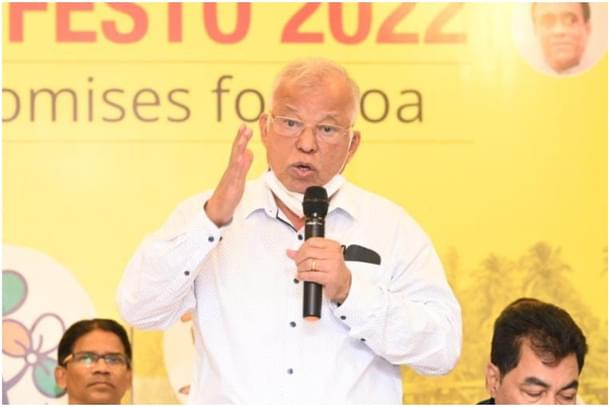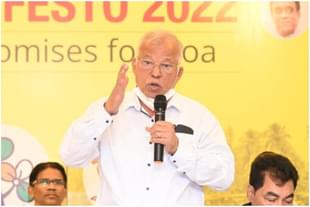Politics
Goa: Luizinho Faleiro Withdraws From Nomination On Last Day; Trinamool Can Only Blame Its Supremo For This Embarrassment
Jaideep Mazumdar
Jan 30, 2022, 12:38 PM | Updated 01:42 PM IST
Save & read from anywhere!
Bookmark stories for easy access on any device or the Swarajya app.


The Trinamool Congress’ most-prized catch in Goa — former Congress chief minister Luizinho Faleiro — has caused the Bengal-based party its biggest embarrassment till date.
Faleiro, a ‘founder’ member of the Trinamool in the tiny coastal state, declared Friday (28 January) that he would not be contesting from the south Goa seat of Fatorda.
The announcement came at the eleventh hour — Friday was the last date for withdrawal of nominations.
The Trinamool had, earlier this month, unilaterally declared Faleiro’s candidature from this seat without consulting him.
Fatorda is not Faleiro’s seat; his turf is the nearby Navelim Assembly constituency, which he has represented seven times — six consecutive terms from 1984 through 2007 and once again from 2017 till he resigned as a Member of the Legislative Assembly (MLA) late last year after joining the Trinamool Congress.
The announcement by the Trinamool (Bengal) leadership that Faleiro would be fielded from Fatorda was a bolt from the blue for Faleiro, who was one of the first Congress turncoats to join the Trinamool in September last year.
Faleiro was incensed over his party’s unilateral announcement and declared to his close aides that he would never contest from Fatorda. According to Trinamool insiders, he conveyed his acute displeasure to his party Rajya Sabha colleague Derek O’Brien and Trinamool’s Goa in-charge Mahua Moitra. (Faleiro was elected to the Upper House on the Trinamool ticket from Bengal in November-end last year.)
Faleiro, who was the chief minister of Goa for two short stints in the late 1990s — 26 November 1998 to 8 February 1999 and 9 June 1999 to 24 November 1999 — was so angry that at one stage he even contemplated leaving the party and resigning from the Rajya Sabha.
That is when Trinamool’s trouble-shooters got into the act and initiated serious efforts to placate Faleiro and prevent his exit from the party. Trinamool chief Mamata Banerjee also spoke to him and apologised for the unilateral announcement about his candidature from Fatorda.
The reason for fielding him from Fatorda, Banerjee explained to Faleiro, was that she wanted to put the Trinamool’s strongest candidate against Goa Forward Party (GFP) chief Vijay Sardesai.
Sardesai had wrested the Fatorda seat from the Bharatiya Janata Party (BJP)’s Damodar Naik in 2017 by a little over 1,300 votes.
But why was Banerjee so keen to defeat Sardesai that she decided to field Faleiro from Fatorda without even consulting him?
The answer lies in the Trinamool chief’s short-temper, her propensity to take offence at even the smallest slights, and her vengeful nature.
The Trinamool had been trying to woo the GFP ever since it forayed into Goa. The GFP, even though it won three seats in 2017, turned out to be a king-maker and played a key role in the formation of the BJP-led government in the state.
Trinamool’s political strategist, Prashant Kishor, had recommended an alliance with the GFP. Kishor, and the Trinamool leadership, reckoned that an alliance with the GFP — a strong Goa-based party with its Goem, Goemkar, Goemkarponn (Goa, Goans, and Goan ethos and interest) slogan — would blunt the widespread impression of the Trinamool as a Bengal-based provincial party.
An alliance with the GFP, reckoned the Trinamool, would give it (Bengal’s provincial party) the much-required political legitimacy in Goa. Talks between the Trinamool and the GFP had reached an advanced stage when the GFP pulled out of negotiations.
A desperate Trinamool reached out to Sardesai, but the latter firmly shut his doors on all intermediaries. Sardesai, said a couple of top Trinamool leaders who spoke to Swarajya, did not even provide any reasons for pulling out of the talks for firming up an alliance when they were in an advanced stage.
Sardesai reportedly realised, albeit a bit late, that he would gain little out of an alliance with the Trinamool.
“Our party chief ultimately understood that the Trinamool was planning to piggyback on our identity as a Goa party to gain legitimacy here. And it also became clear that the Trinamool, despite all the publicity and hype that it has created, is looked upon as an ‘outsider’ by the people of Goa. Hence, there was no point in entering into an alliance with that Bengal-based party,” a close confidant of Sardesai, who did not want to be named, told Swarajya.
The Congress also played a role here. The GFP had, in the run-up to the 2017 assembly polls in Goa, wanted to enter into an alliance with the Congress. But an overconfident Congress spurned its overtures.
Though the Congress emerged as the single-largest party with 17 seats — just four short of a simple majority in the 40-member assembly — it could not form the government because a miffed GFP refused to extend support and went on, instead, to ally with the BJP (which had won only 13 seats).
The GFP’s decision to extend support to the BJP immediately after the announcement of results provided a huge momentum to the saffron party’s efforts to cobble a majority by getting the support of legislators from other parties, including the Congress.
The Congress, keen on not repeating its 2017 mistake, was silently working on the GFP even as the Trinamool was wooing it (the GFP).
The state Congress leadership convinced Sardesai that he would gain nothing from an alliance with the Bengal-based party while all the benefits of an alliance between the Trinamool and GFP would accrue to the Trinamool.
That’s why Sardesai pulled out from negotiations at the eleventh hour, leaving the Trinamool high and dry. The Trinamool then hurriedly stitched an alliance with the Maharashtrawadi Gomantak Party (MGP).
But the MGP is no GFP. While the GFP has an appeal, even if limited, across all sections of Goans, the MGP’s primary support base is non-Brahmin Hindus. The Catholics, who make up about 26 per cent of Goa’s electorate, do not vote for the MGP. Nor do most of the Brahmins.
The pull-out of Sardesai from talks with her party angered Banerjee to no end. Party insiders say she was incensed over what she saw as betrayal.
In response, the Trinamool chief decided to to field a strong candidate from Fatorda, Sardesai’s constituency. Faleiro, she figured, would defeat Sardesai and that would be an apt lesson for the latter.
But in her rage, she forgot to seek Faleiro’s consent or even sound him out before getting her party spokesperson to announce the former chief minister’s candidature from Fatorda.
Banerjee probably assumed that, just as even her senior party colleagues in Bengal unquestioningly bow to her diktats, Faleiro would accept her decision. She never imagined that Faleiro would muster the courage to say no.
But that is exactly what Faleiro, not used to blindly following the dictates of mercurial and authoritarian leaders, did. He told Trinamool intermediaries who met him that there was no way he would contest from Fatorda, which is not his seat.
Despite the best efforts of Trinamool leaders, including Mahua Moitra and Derek O’Brien, Faleiro stood his ground. At one point, he told some Trinamool leaders who were trying to convince him to contest from Fatorda that he would not mind resigning from the Trinamool and the Rajya Sabha.
The Trinamool leadership realised that if Faleiro makes good on his threat, it would be a huge loss of face for the party and would even seal its electoral fate in Goa — especially since a few senior politicians who had joined the Trinamool, like Lavoo Mamledar, Yatish Naik, and Reginaldo Lourenco, had quit.
Lourenco’s public statements — that the electorate of his constituency and his well-wishers were despising him for joining the Bengal-based provincial party — did a lot of damage to the Trinamool’s public image.
That is why the Trinamool was keen on retaining Faleiro. It is learnt that, ultimately, Banerjee’s nephew, Abhishek, promised Faleiro that he would be given an important portfolio in the Union government after the 2024 Lok Sabha elections.
Abhishek is learnt to have told Faleiro that the next Lok Sabha elections will most likely throw up a hung Parliament and, with the Trinamool sure to emerge as one of the largest parties outside the National Democratic Alliance and United Progressive Alliance, it will play a key role in the formation of the next government.
Faleiro also realised that the doors of the Congress, which he ditched six months ago, are firmly shut, at least for now. And at such an advanced age (he is 72), he lacks the stamina and wherewithal to strike it out on his own.
Faleiro agreed to stay on in Trinamool, but was firm in his decision against contesting from Fatorda. The Trinamool then named a novice — a young, little-known lawyer, Seoula Avilia Vas — as its candidate from Fatorda.
Though Moitra tried to give this a spin — that the nomination of Vas was in keeping with the Trinamool’s policy of empowering women and fielding qualified candidates — there was no missing the fact that the party was embarrassed.
Jaideep Mazumdar is an associate editor at Swarajya.




